 W
WIon Antonescu was a Romanian soldier who presided over two successive wartime dictatorships as the Prime Minister during most of World War II. After the war, he was executed.
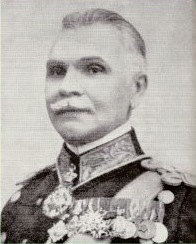 W
WGheorghe Argeșanu was a Romanian cavalry general and politician who served as a Prime Minister of Romania for about a week in 1939.
 W
WTeodor Atanasiu is a Romanian engineer and politician. A member of the National Liberal Party (PNL), he was Minister of National Defence in the Călin Popescu-Tăriceanu cabinet from December 2004 to October 2006. He was a member of the Romanian Chamber of Deputies for Alba County from 2008 to 2016.
 W
WAlexandru Averescu was a Romanian marshal and populist politician. A Romanian Armed Forces Commander during World War I, he served as Prime Minister of three separate cabinets. He first rose to prominence during the peasants' revolt of 1907, which he helped repress in violence. Credited with engineering the defense of Moldavia in the 1916–1917 Campaign, he built on his popularity to found and lead the successful People's Party, which he brought to power in 1920–1921, with backing from King Ferdinand I and the National Liberal Party (PNL), and with the notable participation of Constantin Argetoianu and Take Ionescu.
 W
WAnton Berindei was a Wallachian-born Romanian soldier.
 W
WEmil Bodnăraș was a Romanian communist politician, an army officer, and a Soviet agent, who had considerable influence in Communist Romania.
 W
WIon Constantin Brătianu was one of the major political figures of 19th-century Romania. He was the son of Dincă Brătianu and the younger brother of Dimitrie, as well as the father of Ionel, Dinu, and Vintilă Brătianu. He also was the grandfather of poet Ion Pillat.
 W
WIon I. C. Brătianu was a Romanian politician, leader of the National Liberal Party (PNL), Prime Minister of Romania for five terms, and Foreign Minister on several occasions; he was the eldest son of statesman and PNL leader Ion Brătianu, the brother of Vintilă and Dinu Brătianu, and the father of Gheorghe I. Brătianu. Ion I. C. Brătianu's political activities after World War I, including part of his third and fourth term, saw the unification of the Old Romanian Kingdom with Transylvania, Bukovina and Bessarabia. In 1923, he was elected an honorary member of the Romanian Academy.
 W
WVintilă Ion Constantin Brătianu was a Romanian politician who served as Prime Minister of Romania between 24 November 1927 and 9 November 1928. He and his brothers Ion I. C. Brătianu and Dinu Brătianu were the leaders of the National Liberal Party of Romania, founded by their father, Ion C. Brătianu.
 W
WConstantin Budișteanu was a Wallachian-born Romanian soldier and politician.
 W
WArmand Călinescu was a Romanian economist and politician, who served as 39th Prime Minister from March 1939 until his assassination six months later. He was a staunch opponent of the fascist Iron Guard and may have been the real power behind the throne during the dictatorship of King Carol II. He survived several assassination attempts but was finally killed by members of the Iron Guard with German assistance.
 W
WLascăr Catargiu was a Romanian conservative statesman born in Moldavia. He belonged to an ancient Wallachian family, one of whose members had been banished in the 17th century by Prince Matei Basarab, and had settled in Moldavia.
 W
WAlexandru Cernat was a Moldavian-born Romanian general. Born in Vârlezi, he entered the Moldavian Army in 1851, becoming a general in 1873. In April 1877, he was named minister of war, serving until August, when he was made commander of operations during the Romanian War of Independence. Following the end of hostilities, he was again minister of war from February to November 1878. He resigned following disagreements with the government of the day and domnitor Carol I. From 1881 to 1882, he was Chief of the Romanian General Staff. He retired from the military in 1891, dying in Bucharest two years later.
 W
WHenri Cihoski was a Romanian lieutenant-general during World War I, and Minister of War from 1928 to 1930.
 W
WNicolae Ionel Ciucă is a general of the Romanian Land Forces. Ciucă has participated in several wars, including one in Iraq, where his performance was highly notable. He was the Chief of the Romanian General Staff from 2015 to 2019, and since 4 November 2019, he is the Minister of Defence.
 W
WNicolae Ciupercă was a Romanian general, born in Râmnicu Sărat. He served during World War I and World War II under the Command of Alexandru Averescu and then Ion Antonescu, but would retire from a military life in 1941 over strategy disagreements with Antonescu. He also served as Minister of National Defense in 1938–1939.
 W
WGrigore C. Crăiniceanu was a Romanian military officer.
 W
WNicolae Dabija was a Romanian general and politician.
 W
WMircea Dușa is a Romanian economist and politician, who was the Minister of National Defense from 21 December 2012 to 17 November 2015 in the cabinets of former Prime Minister Victor Ponta.
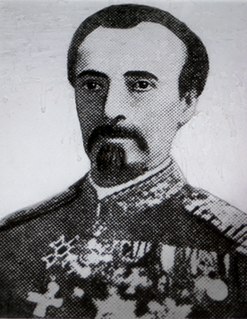 W
WȘtefan Fălcoianu was a Romanian army general who served as Chief of the General Staff and War Minister.
 W
WMihai-Viorel Fifor is a Romanian politician.
 W
WNicolae Filipescu was a Romanian politician.
 W
WIon Emanuel Florescu was a Romanian army general who served as Prime Minister of Romania for a short time in a provisional government in 1876 and then in 1891.
 W
WSorin Frunzăverde was a Romanian politician. He served as the Minister of National Defense of Romania on two occasions as well as the Minister of Tourism and Ministry of Water, Forestry and Environmental Protection. He was also the President of the Caraș-Severin County Council a member of the Parliament of Romania and a Member of the European Parliament from 2007 to 2009. Formerly a member of the Democratic Liberal Party, he joined the National Liberal Party in 2012.
 W
WPrince Ioan Grigore Ghica was a Romanian politician who served as the Minister of Foreign Affairs of Principality of Romania from 29 September 1862 to 29 August 1863 and as the Minister of National Defense of Principality of Romania in two terms from July 19, 1861 until September 29, 1862 and from May 11, 1866 until August 5, 1866. He was the son of the last Prince of Moldavia Grigore Alexandru Ghica. Ioan Grigore Ghica also served as the ambassador to Istanbul, Vienna, Rome and Saint Petersburg.
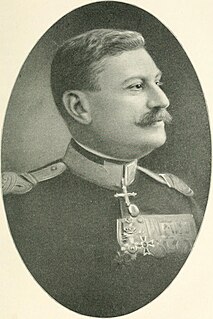 W
WEremia Teofil Grigorescu was a Romanian artillery general during World War I, and Minister of War in the Constantin Coandă cabinet.
 W
WNicolae Haralambie was a Romanian soldier and politician.
 W
WConstantin Iancovescu (1862–1945) was a Romanian politician and general.
 W
WRadu Irimescu was a Romanian businessman, politician, and diplomat.
 W
WIacob N. Lahovary was a member of the Romanian aristocracy, a general, politician and diplomat who served as the Minister of War and Minister of Foreign Affairs of the Kingdom of Romania.
 W
WMihail Lascăr was a Romanian General during World War II and Romania's Minister of Defense from 1946 to 1947.
 W
WDimitrie Lecca was a Moldavian-born Romanian soldier and politician.
 W
WIuliu Maniu was a Romanian politician. A leader of the National Party of Transylvania and Banat before and after World War I, Maniu served as Prime Minister of Romania for three terms during 1928–1933, and, with Ion Mihalache, co-founded the National Peasants' Party.
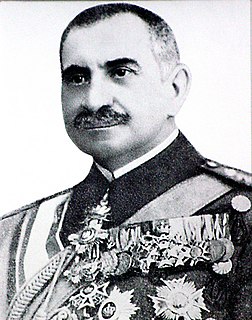 W
WGheorghe Manu was a Romanian Army general, artillery inspector and statesman. He served as Prime Minister (1889–1891), Minister of War, Minister of the Interior, President of the Assembly of Deputies, and Mayor of Bucharest.
 W
WGheorghe D. Mărdărescu was a Romanian army major general during World War I and a commander during the Hungarian–Romanian War. He was Romanian Minister of War from 20 April 1922 to 29 March 1926.
 W
WTeodor Viorel Meleșcanu is a Romanian politician, diplomat, and jurist. He served as Director of the Foreign Intelligence Service of Romania (SIE) between 2012 and 2014.
 W
WVasile Milea was Nicolae Ceaușescu's minister of defense during the Romanian Revolution of 1989 and was involved in the reprisal phase of the revolution that caused the deaths of 162 people.
 W
WNicolae Militaru was a Romanian general who served as Defense Minister between December 1989 and February 1990.
 W
WTraian Moșoiu was a Romanian general during World War I and the Hungarian–Romanian War. He held the posts of Minister of War in the Alexandru Vaida-Voevod cabinet, Minister of Communications and of Industry and Commerce in the Ion I. C. Brătianu cabinet.
 W
WMihnea Ioan Motoc is a Romanian diplomat who served as Minister of Defence of Romania between November 2015 and January 2017, in the Cioloș Cabinet. Before this appointment, he was the country's ambassador to the EU, and briefly the country's ambassador in London. Currently, he is the deputy head of the European Political Strategy Centre.
 W
WConstantin D. Nicolescu was a Romanian career army officer.
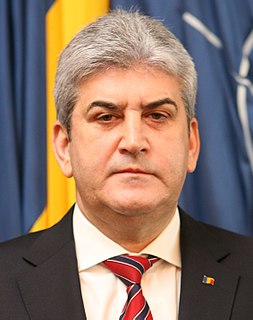 W
WGabriel Oprea is a Romanian politician and a general in the army reserves. The former president of the National Union for the Progress of Romania and a former member of the Social Democratic Party (PSD) who is now an independent, he was a member of the Romanian Chamber of Deputies for Ilfov County from 2004 to 2012 and was a Senator for Bucharest from 2012 to 2016. In the Adrian Năstase cabinet, he was Minister-Delegate for Public Administration from June 2003 to July 2004; in the Emil Boc cabinet, he was Minister of Administration and Interior from December 2008 to January 2009; again under Boc and continuing under Mihai Răzvan Ungureanu, he was Defence Minister ; and in the Victor Ponta cabinet, served as deputy prime minister from December 2012, additionally holding the Interior portfolio from January 2014. From June to July 2015, and again from late July into August, he was interim Prime Minister of Romania. That November, he left the government after Ponta's resignation.
 W
WIoan Mircea Pașcu is a Romanian politician and Member of the European Parliament (MEP) from Romania. He previously served Minister of Defense from 2000 to 2004. He is a member of the Social Democratic Party, part of the Party of European Socialists.
 W
WIoan Mihail Racoviță was a Romanian general during World War II, and Minister of Defense in the aftermath of King Michael's Coup of August 1944.
 W
WLeontin Sălăjan was a Romanian communist military and political leader.
 W
WVictor Atanasie Stănculescu was a Romanian general during the Communist era. He played a central role in the overthrow of the dictatorship by refusing to carry out the orders of Romanian dictator Nicolae Ceaușescu during the Romanian Revolution of 1989. His inaction allowed the citizens demonstrating in Bucharest against the government to seize control. In addition, as a defense minister on 25 December 1989, Stanculescu organized the trial and execution of Nicolae Ceaușescu and Elena Ceaușescu.
 W
WMihai Stănișoară is a Romanian engineer and politician. A member of the National Liberal Party (PNL) and formerly of the Democratic Liberal Party (PD-L), he was a member of the Romanian Chamber of Deputies for Mehedinţi County from 2000 until March 2007, and has sat in the Romanian Senate since December 2008, representing the same county. In the Emil Boc cabinet, he was Minister of National Defence from December 2008 to December 2009.
 W
WConstantin I. Stoicescu was a politician and diplomat who held several ministerial positions in the Kingdom of Romania.
 W
WDimitrie Sturdza was a Romanian statesman and author of the late 19th century, and president of the Romanian Academy between 1882 and 1884.
 W
WGheorghe I. Tătărescu was a Romanian politician who served twice as Prime Minister of Romania, three times as Minister of Foreign Affairs, and once as Minister of War (1934). Representing the "young liberals" faction inside the National Liberal Party (PNL), Tătărescu began his political career as a collaborator of Ion G. Duca, becoming noted for his anti-Communism and, in time, for his conflicts with the PNL's leader Dinu Brătianu and the Foreign Minister Nicolae Titulescu. During his first time in office, he moved closer to King Carol II, leading an ambivalent policy toward the fascist Iron Guard and ultimately becoming instrumental in establishing the authoritarian and corporatist regime around the National Renaissance Front. In 1940, he accepted the cession of Bessarabia and Northern Bukovina to the Soviet Union, and consequently had to resign.
 W
WChristian Tell was a Transylvanian-born Wallachian and Romanian general and politician.
 W
WArtur or Arthur Văitoianu was a Romanian general who served as a Prime Minister of Romania for about two months in 1919. During his mandate, the first elections of Greater Romania were held.